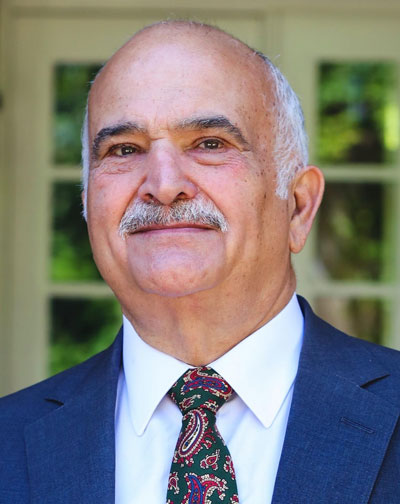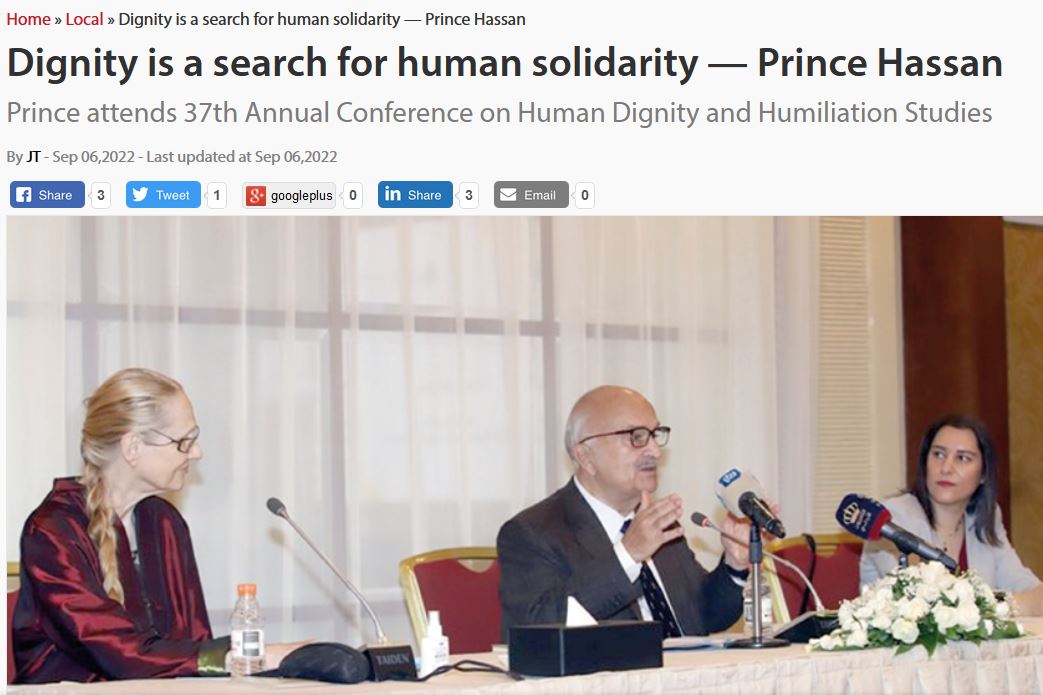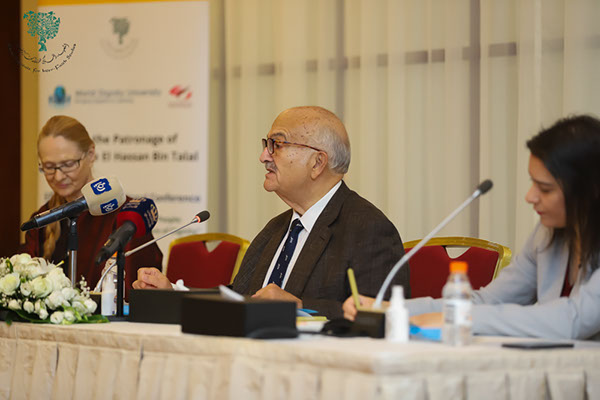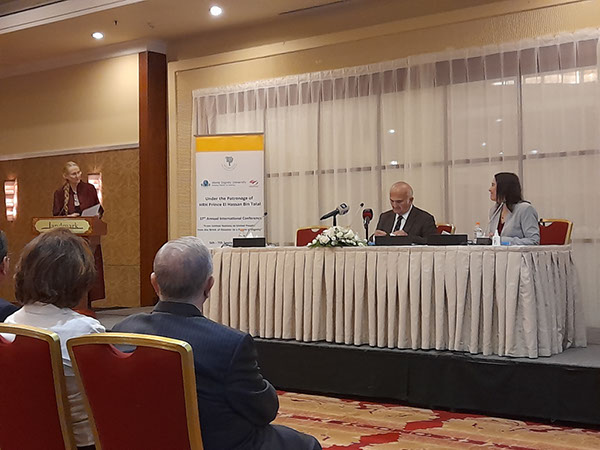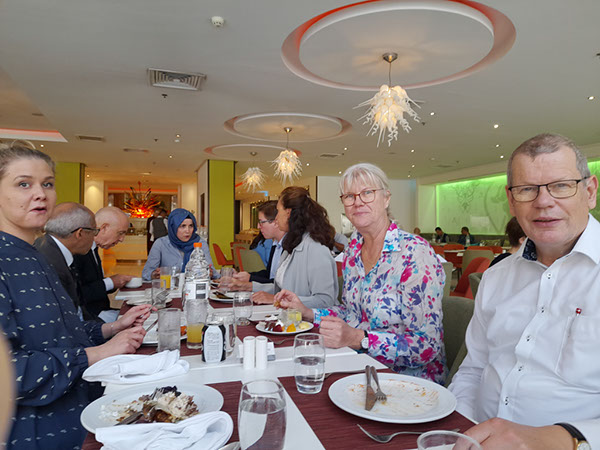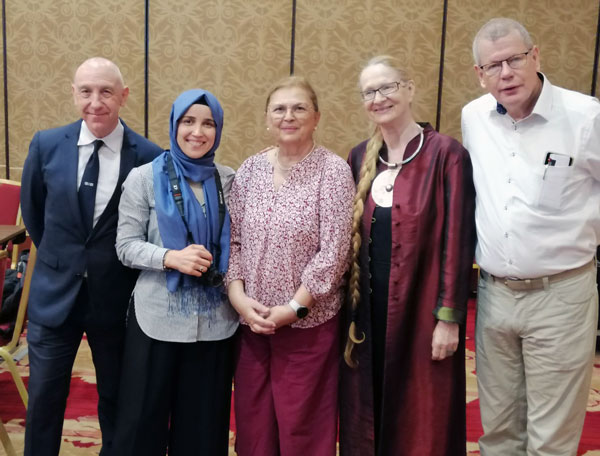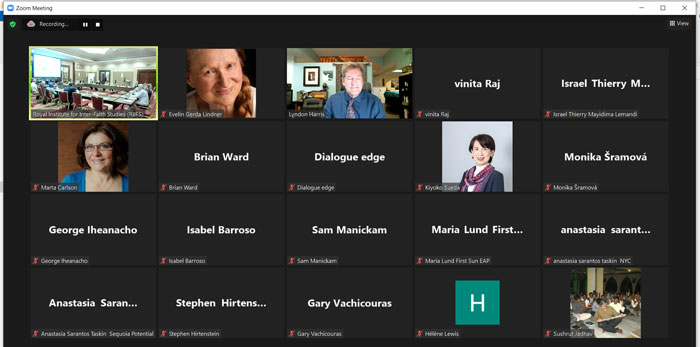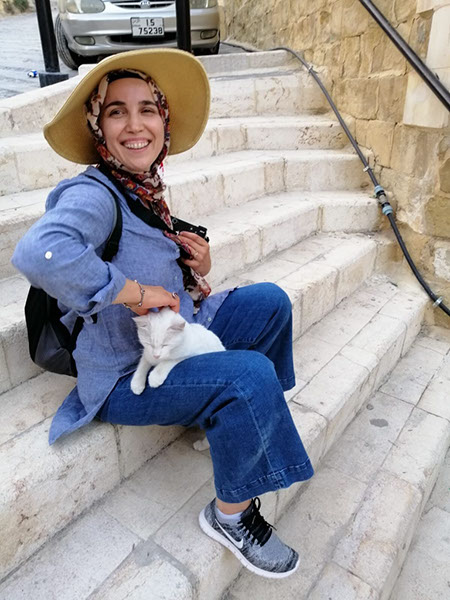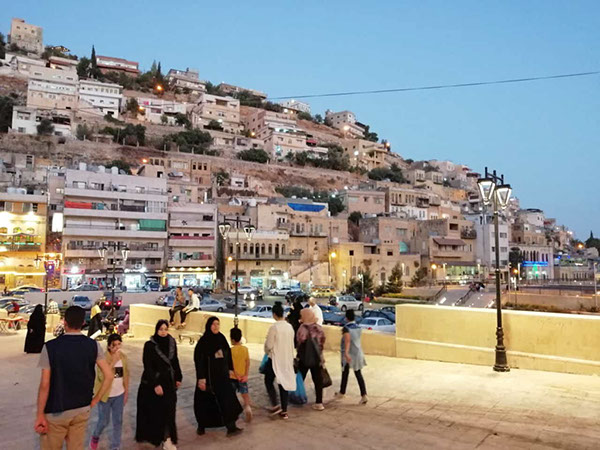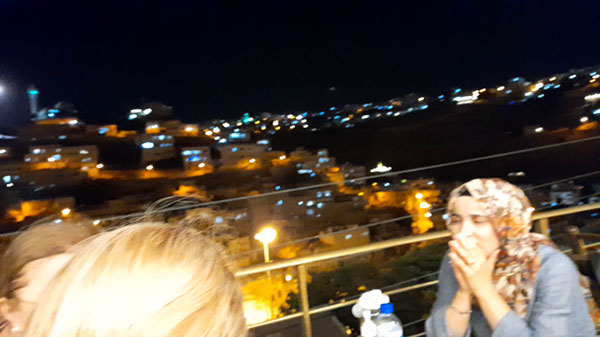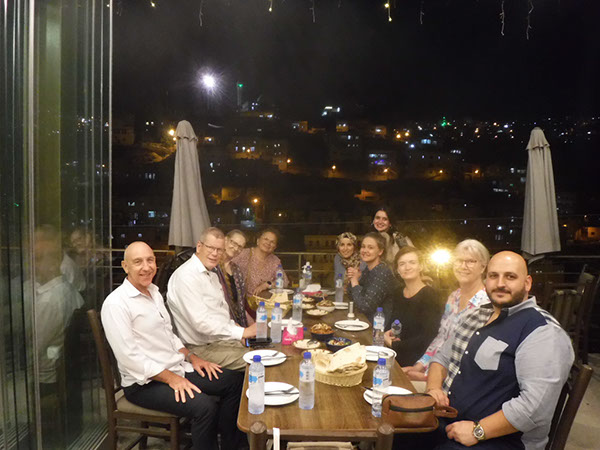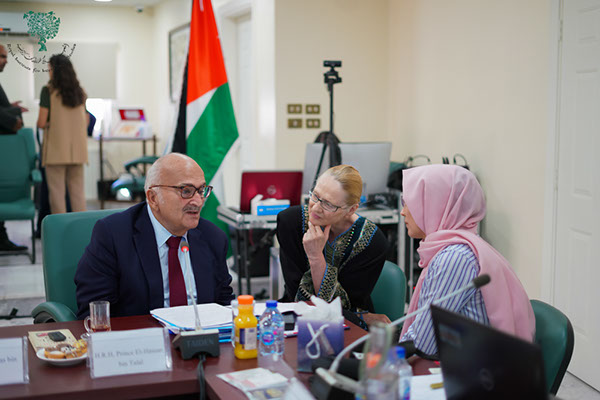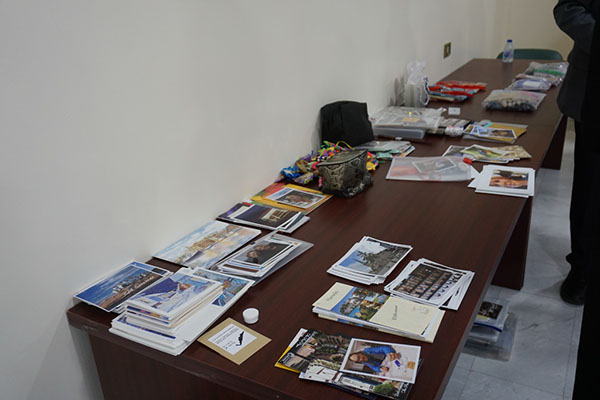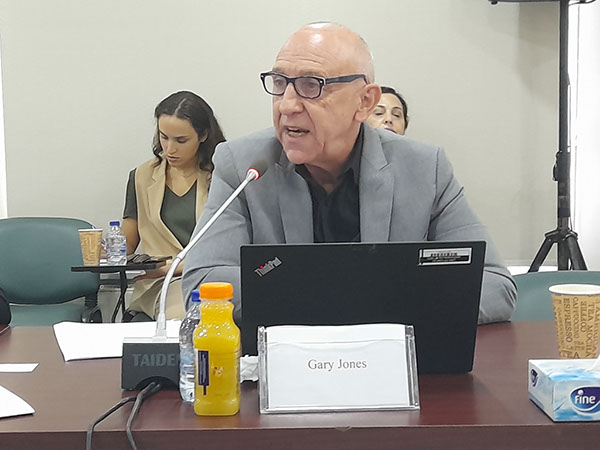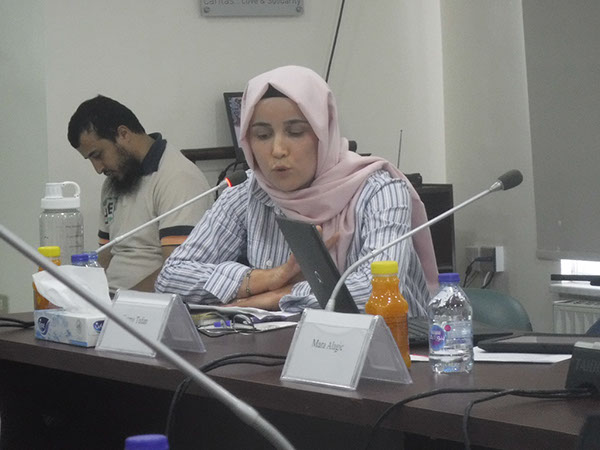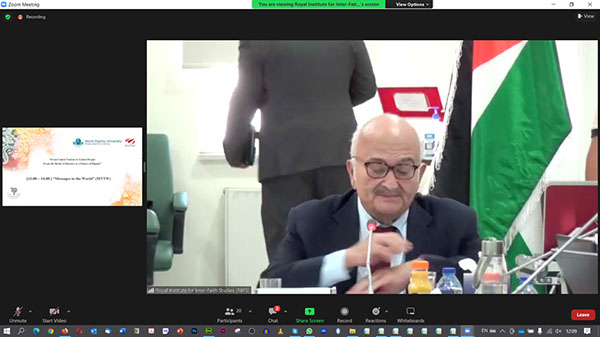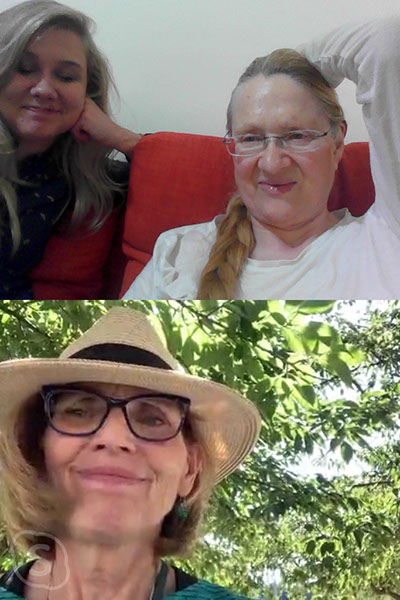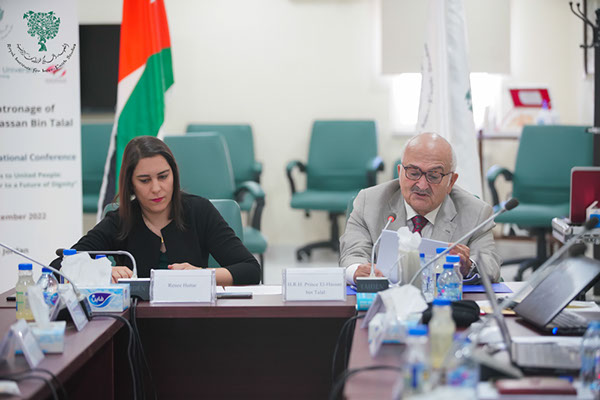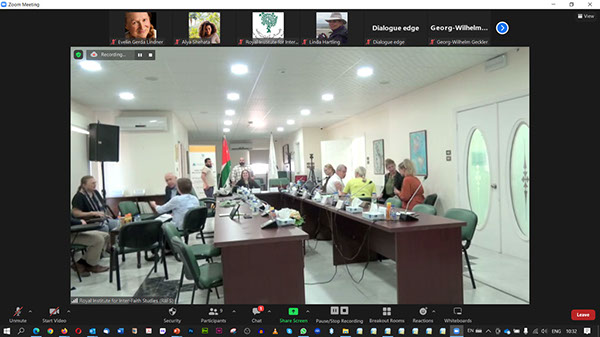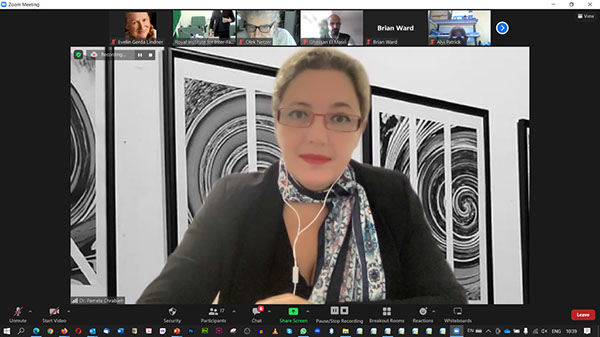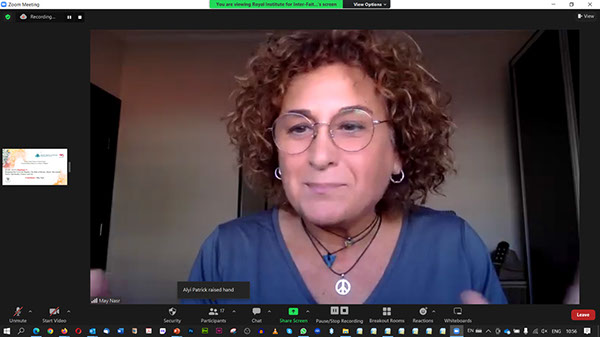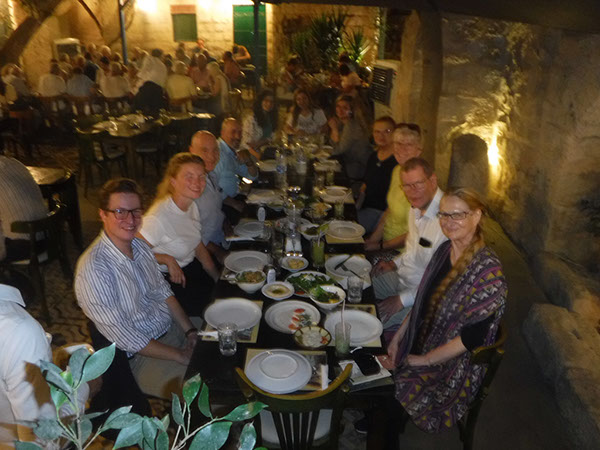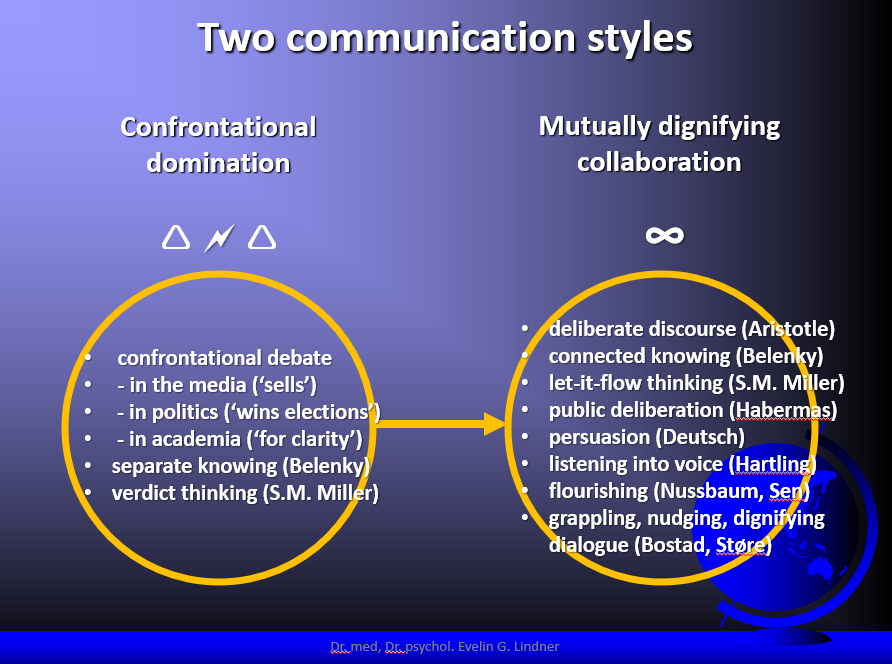Newsletter Nr. 37 (September 2022, subsequent to our 37rd Annual Conference of Human Dignity and Humiliation Studies, in Amman, Jordan, 5th – 7th September 2022)
Compiled by Evelin G. Lindner, in 2022
(Note: This newsletter is written in British English, since this conference took place outside of the U.S. In our NY workshops, we usually use American English.)
Contents
• Pictures
• Thanks!
• Evelin Lindner's reflections
• Your reflections after our conference
• Announcements and Good News
• What Is the Aim of Our Work?
• Welcome Again!
Pictures
(Important note to our conference particants: During our conferences, we always make an effort to ask for your permission to have your pictures posted on this website. However, you may have overheard or misunderstood our question, or you may have changed your mind since, either in total or for specific pictures/videos, please let us know! Thank you! Since we wish to walk the talk of dignity, it is very important for us to do our utmost in respecting everybody's privacy. We refrain from gathering written permissions from you during our conferences, since we value the building of mutual trust in relationships, and we also would like to refrain from contributing to an ever more bureaucratic and legalistic society.)
|
Public Opening Event:
|
Workshop Part with Dignilogues:
Day One
|
Afternoon of Day Two: Excursion to Al-Salt (Al-Salt was added to the UNESCO World Heritage list in 2021)
|
Workshop Part with Dignilogues:
Day Two
|
Workshop Part with Dignilogues:
Day Three
|
Afternoon of Day Three: Excursion to o Mount Nebo and Madaba
|
Dear Friend! Thanks!
We had a remarkable dignity conference in Amman, Jordan. We lack adequate words to express our appreciation, admiration, and deep gratitude to all those who made this conference possible! We are deeply thankful to His Royal Highness Prince El Hassan bin Talal for inviting us and for participating with his wisdom during all three days! We are equally thankful to The Royal Institute for Inter-Faith Studies (RIIFS) and its incredible leadership for creating an unforgettable programme! The director of RIIFS Renée Hattar, together with Sandy Qaqish and Zain Fashho made the impossible possible. Each day was filled with wonderful Dignilogues and followed by amazing events each afternoon. On the first day, the excursion went to Al-Salt (Al-Salt was added to the UNESCO World Heritage list in 2021), on the second day, all participants were honoured to be Invited at the Royal Palace of Prince El Hassan, and on the third day, the excursion went to to Mount Nebo and Madaba.
This was the backdrop of our conference: ‘Winning the Human Race Against Time’ was the title of a conversation that was held on 28th June 2022 between the former head of the Club of Rome, His Royal Highness Prince El Hassan bin Talal of Jordan, and Mark Green, the President of the Wilson Center, a think tank that informs public policy, based in Washington, DC, United States. This conversation was introduced with the following words, ‘West Asia-North Africa is in a race against time. Within the next thirty years, increasing air pollution and climate change-induced heatwaves and droughts will push the region closer to uninhabitability, triggering unprecedented levels of human insecurity and large-scale displacement’.
His Royal Highness Prince El Hassan bin Talal of Jordan became aware of our dignity work through the ‘Corona’ article Evelin wrote in 2020.
• Kindly see our Final Invitation sent out on 30th August 2022 (backup on this website)
• See our Dignity Letter — August 2022 — From United Nation to United People, sent out on 15th August 2022 (backup on this website)
• See also our Dignity Letter — May 2022 — Dignity in Times of Crises, sent out on 16th May 2022 (backup on this website)
• Many international guests stayed at the Gallery Guest House, Omar Al Khayyam 28, Amman, +962 776761001. We thank Thair Khasawneh most warmly for his wonderful care!
Our 37th Annual HumanDHS Dignity Conference in Amman was unlike any other we had before! Never before were we blessed to have one of the wisest thinkers of the planet with us — on a par with Nelson Mandela, Mahatma Gandhi, or Martin Luther King Jr. His Royal Highness Prince Hassan, former head of the Club of Rome, formulated warnings in the 1960s that are as relevant in 2022.
All participants received these books as a gift at the end of the conference:(1) Bin Talal, Prince El Hassan (1979). A study on Jerusalem. London, New York Longman, in collaboration with the Publishing Committee Amman, Jordan.
(2) Bin Talal, Prince El Hassan, and Prince of Wales (Foreword) (1995). Christianity in the Arab world. Amman, Jordan: Royal Institute for Inter-Faith Studies (RIIFS).
(3) Bin Talal, Prince El Hassan (2001). Continuity, innovation and changes: Selected essays. Amman: Majlis El Hassan.
(4) Bin Talal, Prince El Hassan, and Alain Elkann (2004). To be a Muslim: Islam, peace, and democracy. Brighton: Sussex Academic Press.
(5) The Independent Commission on International Humanitarian Issues, Prince Sadruddin Aga Khan (Foreword), and Prince El Hassan Bin Talal (Foreword) (1998). Winning the human race? London: Zed Books.Allow us to share some quotes here. In his 2001 book titled Continuity, Innovation and Changes: Selected Essays (Amman: Majlis El Hassan), HRH wrote on page 1–2:
Humanitarianism is a basic orientation toward the interests and welfare of people that encompasses both humanism and human rights, while going beyond the confines of existing humanitarian law. It hinges on an ethic of human solidarity. The cornerstones of the corresponding conceptual framework are the values which from time immemorial have been a part of the collective consciousness of the human species, which have ensured their survival and well-being, and which have stood the test of time:
- Respect for life
- A responsibility towards future generations
- Protection of the human habitat
- Altruism nurtured by a sense of mutual interest and a recognition of human dignity and worth.He continues on page 5:
I have worked for over thirty years to help create a world in which dialogue, cooperation and peace are so commonplace that they excite no comment; but the world I seek still eludes me. Today I invite you to join in my quest. Together, let us pursue the vision of a world beyond discrimination, in which each and every individual has the right and the opportunity to develop without prejudice, intolerance or oppression of any kind.
He writes on page 53:
Issues such as resources, the environment, refugees and arms control are by their very nature transnational, and must therefore be addressed collectively. This includes not only the regional players, but also the international community at large. For any one player to attempt to exert military, poltical or economic hegemony in the region can only lead to stultification throughout the region, and the perpetuation of the material disparities that currently fuel the political economy of despair.
He continues on pages 56–57:
These requirements and rights, like so many of the challenges of today's world, go beyond questions of national strategy or ideological labels. They form the starting point of a humane discourse that appreciates the common ground and moves towards a constructive dialogue. Growing awareness of the ecological paradigm across the world is a cause for much optimism. We feel that this may in turn lead us to a paradigm in which the human person is restored as the proper focus of politics and economics: a new ‘anthropolitics' for the 21st century and beyond. Various proposals, including the implementation of a Human Charter, have been put forward to this end. We find in their substance much to consider, and much yet to be done, if the World is to develop into the place we wish our children to inherit. For they will inherit it together, as one; and so will have little patience with antiquated protestations of regional strategic considerations nd rivalries.
We thank all participants for joining hands in making this conference one of our most special and most memorable ones. Everyone participated by not only offering their particular personal perspectives, everyone also engaged in an enormously enriching process of co-creating new horizons of meaning for ourselves and for our societies, including world society.
Linda and I, we would like to invite everyone to contribute to this newsletter with your reflections (whatever you wish to share here, just send it to me so that we paste it in further down)! We invite comments, thoughts, and reflections both from the participants, and from those who were with us in spirit!
Please allow us to remind everyone that all our conferences are part of our ongoing relationship-building work (rather than 'stand-alone' events). We wish to nurture a global community of people who strive to bring more dignity into the world in the long term. Our 37th Annual Dignity Conference was yet another opportunity, unique in its intensity, one that deeply inspired also me personally. The diversity of backgrounds of our participants was remarkable: It was a hybrid conference, with 125 participants registered from all around the world in addition to the local participants. Many members in our global network share a biography of journeying, both geographically and with respect to their life paths and experiences. Many have experienced profound turning points in their lives, which often foster deep change.
As you have noticed, we strive to conduct our conferences in ways that are different to mainstream conferences. Our conferences are designed to transcend the 'guru' model of having one or two noted celebrities orchestrating the experience for the non-celebrities. We wish to avoid a top-down approach to organising. Rather, we strive to practice a ripple-out approach, cultivating mutually beneficial action that emphasises loving service (rather than servitude!). We strive to refrain from relegating 'administrative' work to secretaries or marginalised members of society. We invite universal responsibility, universal co-leadership, leadership that encourages everyone to step in and contribute according to their interests, abilities, and passions.
In traditional conferences, participants arrive with the tacit expectation to spend the day more or less isolated, either as presenters or listeners, and when the official day ends, they expect to dissipate to do 'their own thing'. The only time when everybody is drawn together officially, at least to a certain degree, is during what is called Q&A (questions and answers, rather than dialogue). Group-building is relegated to the coffee-pauses or friendships being nurtured privately on the sidelines. As a result, very often, there is a widespread sigh after conferences: 'I had to give a paper to get funding for the conference, but slept through the presentations of the others, only the coffee-breaks where really good, because I enjoyed meeting old friends'.
In this conference, His Royal Highness, with his towering experience and intellectual presence, could have played the 'guru' role, however, he did not. He contributed in the most humble and enriching ways imaginable. Furthermore, not least due to security requirements, there was more administrative attention needed in this conference than in others. We thank the staff of RIIFS and the Majlis for their sensitive and efficient work. Last, the conference would not have been possible without the diligent planning and organising of Renée Hattar, the director of RIIFS, together with Sandy Qaqish and Zain Fashho.
The most important aim of our conferences is to make clear that the 'work' of building a dignity family is the most important feature of our conferences. Our participants are invited to take responsibility for this process also outside of the 'official' schedule. Linda and I see our main task in nurturing this social-psychological connectivity rather than in the administration or scheduling of our conferences, as important as also this is for a dignified conference. We wish to nurture a climate of togetherness in equal dignity, of holding hands as human beings among human beings (Ubuntu), who act together in a spirit of mutual responsibility for each other, and who engage in mutual learning and teaching. We aim for a style that manifests the fact that we are one single human family on one single tiny planet, and that we have to learn to cooperate like any good family would do, if we wish to survive as a species. In our work, we wish to stay clear of abusing this connectivity for ulterior purposes, be they ideological, religious, monetary, or else. This approach includes the entire conference, with its pauses and evenings.
Rather than organising time around 'presentations', we always strive to take a collaborative approach to planning our time together. We use the format of Dignilogues (Dignity + Dialogue), or conversations on topics proposed by participants, a format that we have adapted from the classical Open Space approach (see Harrison Owen on our Global Advisory Board). On the first day of our Dignilogue Workshop, we usually invite everyone to suggest a topic and to be a facilitator/leader for her or his dialogue session. Those participants who propose a topic, then describe it to the group. Then, collectively, we combine and prioritise ideas as needed to finalise the schedule for the rest of the conference. The Dignilogue process encourages us to meet in a spirit of mutual support, equal dignity, and flexibility, which enriches the conversations throughout our 'unconference' conferences.
We sometimes compare a 'formal conference' with a car without wheels, an 'informal conference' with a car without a motor, while our approach would represent a car that moves. We wish our conferences to manifest dignity, and therefore we invite all participants to move the conference forward together, holding hands as fellow human beings, rather than having a rigidly steered conference.
Let me now explain our solidarity economics approach (see also my book A Dignity Economy). All participants are usually gifting their time pro bono. Our work is a labour of love. Nobody is being paid or gains monetary advantages from our work. Our human dignity movement has a near zero budget. We refrain from going down the path of so many not-for-profit initiatives, which end up becoming 'profiteering non-profits'. We do whatever we can to refrain from building an 'empire' of our work. What we wish to do instead, is to nurture dignity, at all levels and in all details of our work. We wish to highlight our shared humanity on our home planet, rather than abusing social-psychological connectivity for 'empire building'.
There are no registration fees for our HumanDHS conferences (or our online sessions). By practicing a 'lean, green' spirit of shared responsibility, our HumanDHS community has conducted our events for more than two decades by assessing our expenses during the conferences and inviting participants to contribute according to their ability (we also gladly welcome electronic contributions in support of our work). I myself live almost without money and do not receive monetary remunerations for my dignity work, which I consider to be a labour of love which I gift to our human family. In our conferences, we always attempt to find ways to cover the cost throughout the conference in the most dignified and dignifying ways. In this collaborative way, we are able to also honour those who contribute more in kind than in monetary ways.
Please join us therefore in thanking everyone for their contributions to this conference! We send our profound gratitude to every single participant and supporter for your generosity! You are beacons of dignity in this world!
Since all participants in our conferences are fully responsible for bearing the cost of their own travel, transportation, and accommodation arrangements, we always kindly ask local participants who reside in close proximity of the conference venue to lend a helping hand to those travelling from afar, which also helps us keep our events collaborative and affordable for all. Allow us to extend our warmest thanks to all those who reside locally and generously gave their support to our foreign participants!
A reason for sadness was that Linda Hartling and her husband Richard Slaven could not be with us in person, due to their family health situation. However, they were very very close in spirit, and without their daily support our conferences would not be possible. Thank you, dear Linda and Rick!
In preparation for attending this workshop, all participants were kindly asked to make themselves familiar with
the Appreciative Enquiry Frame that we use in our work
See an introduction created by Linda Hartling on 23rd August 2022 for this conference
(see also 2021, 2020, 2019, 2016, 2015, 2014 (see also Pdf), 2012, 2011,
and see An Appreciative Frame, written by Linda Hartling in 2005, and see also an early overview)
All participants were furthermore kindly asked to learn about our
Dignilogue (Dignity + Dialogue) Approach and Connection-Reflection Groups
We warmly welcome you to our future conferences. Your participation is of great importance. We are certain that your contribution will have enduring reverberations not only for your work, but also for our dignity network of scholars and practitioners working throughout the world.
Francisco Gomes de Matos, peace linguist from Recife, Brasil, co-founder of the World Dignity University initiative, kindly sent us these reflections from Recife, Brasil, 11th June 2022:
What is dignity?
A quality serving Humanity that is:
Character-elevating
Humility-testing
Solidarity-promoting
Respect-enhancing
Globally-influencing
Community-educating
Equality-sustaining
...
Please add other features!
May we extend our very warmest thank-you to YOU ALL!
There are no words to express our appreciation for your amazing contributions!
Evelin & Linda, on behalf of our entire network, 2022
Reflections
Experiences and reflections shared by Evelin Lindner
Please click on the picture to see it largerAs mentioned earlier, the most important work in our conferences is the building of relationships, the nurturing of a dignity family. Many people in the world are very intelligent and diligent, hard-working, and prolific. Few, however, have the sensitivity for humility, for walking the talk, for understanding the significance of dignity (with humiliation as its violation). This sensitivity is like a foreign language that some people seem to know intuitively, perhaps through particularly educative or even harsh life experiences. We look for people who embody and cultivate the language of dignity through their efforts. This is what is most important for us, more important than any 'tangible product' or achievement.
Through our work, we attempt to spell out in ever more depth what this new language of equal dignity in solidarity is all about, of which, so far, so few people have an inkling. And we ourselves, of course, are also only learners. We strive to deepen and expand the explanation of what we mean when we speak of 'appreciative approach'. Our experience has shown that more is needed than abstract words. We need to make palpable how we interpret the practice of what we mean by 'sensitivity for others', by 'engaging in dignity communication and solidarity', by 'generous humility in contrast to narrow self-righteousness'.
Part of this effort is to transcend the mainstream belief, or rather 'disbelief', that combative debate is needed for scientific work to be scientific, that combative debate is the 'gold standard' of academic encounters. In our Human Dignity and Humiliation Studies network, we invite everyone to engage in mutually enriching co-reflection rather than in rigid statements of alleged truths for others to either conform or oppose. We do everything in our power to inscribe our work into a culture of deliberative discourse, in Aristotle’s terminology, rather than a culture of debate. When Aristotle spoke of deliberative discourse, he thought of jointly conversing about the advantages and disadvantages of proposed actions with the aim to synthesise novel solutions embedded in creative problem solving. Philosopher Jürgen Habermas calls this public deliberation. Our many years of experience have shown that this is more beneficial than confrontation.
Psychologist Carl Rogers’s client-centred therapy and student-centred learning stipulates that one should not judge or teach other people but rather facilitate one another’s learning. The concept of dialogue by educator Paulo Freire is akin to researcher Mary Belenky's calls for ‘connected knowing’ rather than ‘separate knowing’. Connected knowing means that ‘one attempts to enter another person’s frame of reference to discover the premises for the person’s point of view’. Connected knowing can also be called ‘women’s ways of knowing’ in contrast to ‘masculinist objectification’. Philosopher Ágnes Heller has observed that masculinist models of consciousness objectify world order, that they obfuscate how fluid and continuously malleable the world in reality is. Philosopher Martin Buber invites into I-Thou dialogue rather than rigid I-It instrumentalisation.We hope to be able to offer a seminar on Cooperation and Conflict Resolution for our World Dignity University initiative at some point in the future. We cannot expect that mainstream academics, even the most established ones, have learned the sensitivity for dignity that we wish to develop in our work. Academics may even be in a disadvantaged position, as it is difficult for them to admit being wrong, let alone being biased. Being invited to learn humility may not be welcome, as arrogance is built into the very culture of debate and 'winning the argument'. Readiness to 'fight back' in combative debates is often seen as true strength.
Psychologist Thomas Teo analyses in depth how unconscious bias (he addresses racism) has become systemic in scientific method by stipulating that the only path to knowledge is through excluding the relational context of the researcher. He writes in his 2022 article titled, 'What Is a white epistemology in psychological science? A critical race-theoretical analysis' (in Frontiers in Psychology, 13, 861584–84, doi: 10.3389/fpsyg.2022.861584): 'The context of justification excludes questions about the societal, historical, cultural, interpersonal, or personal sources of knowledge and excludes the reasons why researchers are interested in what they are studying. The context of discovery was banned from epistemic debates by leaders of positivism, of naïve empiricism and in psychology. However, understanding the external sources of knowledge is particularly relevant when studying race'.
I personally feel uncomfortable with the combative academic practice of defending or rejecting theories or theoretical concepts, uneasy with dissecting concepts by agreeing or disagreeing with them as if academic inquiry were a war zone. Rather, I like to embrace and learn from all insights, I welcome whatever input might bring light into the blind spots of which I am unaware. Like everyone else, I am part of the cultural forces of our time, all of which shape our perceptions, thinking, and emotions, and this includes our blind spots.
My lived experience of seeing our world has always been the primary pathway into my research and this book attempts to make this pathway visible to the reader. As intuitive seeing is the starting point for my work, I like to decipher correspondences between my own intuitions and all symbolical ideas and strands of academic thinking that I encounter around the world. I welcome all information that helps me widen my horizon, everything that can sharpen and deepen my differentiations. When I have an intuition, I focus on all elements I feel worth adding to my narrative, I look for all theories and models that either resonate with my intuitions, put them in question, or transform them. The main point is that I always remain humble and open, always aware that all human knowledge is limited.
My 2001 article 'How Research Can Humiliate', might be interesting in this context.
What Is the Aim of Our Work?
Please read more in newsletter12.
Welcome Again!
We would like to end this newsletter by thanking all conference participants for co-creating a deeply enriching experience. All our network members have been with us in spirit throughout the conference, and we are very grateful for their ongoing encouragement and support.
Please be most warmly welcomed to our future conferences.
WELCOME!!!
Linda & Evelin, September 2022

